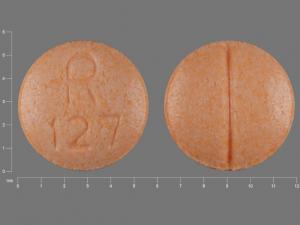Clonidine (injection)
Generic name: clonidine (injection) [ KLON-i-deen ]
Brand name: Duraclon
Dosage form: injectable solution (100 mcg/mL; 500 mcg/mL)
Drug class: Antiadrenergic agents, centrally acting
What is clonidine?
Clonidine injection is used in combination with opioid medication to treat severe pain caused by cancer, when opioid pain medicine alone is not effective in relieving pain.
Clonidine may also be used for purposes not listed in this medication guide.
Clonidine side effects
Get emergency medical help if you have signs of an allergic reaction: hives; difficult breathing; swelling of your face, lips, tongue, or throat.
Clonidine may cause serious side effects. Call your doctor at once if you have:
-
a light-headed feeling, like you might pass out;
-
slow heartbeats;
-
weak or shallow breathing;
-
signs of infection around the infusion catheter, such as warmth, redness, or swelling;
-
fever; or
-
headache, neck stiffness, vomiting, increased sensitivity to light.
Common side effects of clonidine may include:
-
dizziness, drowsiness;
-
depressed mood;
-
confusion.
This is not a complete list of side effects and others may occur. Call your doctor for medical advice about side effects. You may report side effects to FDA at 1-800-FDA-1088.
Related/similar drugs
Warnings
You should not use clonidine if you have bleeding problems, or if you take a blood thinner (warfarin, Coumadin).
Before taking this medicine
You should not use clonidine if you are allergic to it, or if you have:
-
bleeding problems; or
-
if you take a blood thinner such as warfarin (Coumadin).
Tell your doctor if you have ever had:
-
high or low blood pressure;
-
heart problems; or
-
kidney disease.
It is not known whether this medicine will harm an unborn baby. Tell your doctor if you are pregnant or plan to become pregnant.
You should not breast-feed while using clonidine injection.
How is clonidine given?
Follow all directions on your prescription label and read all medication guides or instruction sheets. Your doctor may occasionally change your dose. Use the medicine exactly as directed.
Clonidine injection is given around the clock (continuous) using an infusion pump attached to a catheter placed into the space around your spinal cord. A healthcare provider can teach you how to properly use the infusion pump by yourself.
Your breathing, blood pressure, oxygen levels, kidney function, and other vital signs will be watched closely when you first start using clonidine.
Read and carefully follow any Instructions for Use provided with your medicine. Ask your doctor or pharmacist if you don't understand all instructions.
Do not use the medicine if it has changed colors or has particles in it. Call your pharmacist for new medicine.
Do not stop using clonidine without first asking your doctor. If you stop using this medicine suddenly, you could have unpleasant withdrawal symptoms (nervousness, agitation, tremors, or increased blood pressure). Ask your doctor how to safely stop using this medicine.
Tell your doctor right away if you stop using clonidine injection for any reason.
Store at room temperature away from moisture and heat.
Do not keep leftover clonidine that is no longer needed. Throw the vial away, even if there is still medicine left inside.
Use a needle and syringe only once and then place them in a puncture-proof "sharps" container. Follow state or local laws about how to dispose of this container. Keep it out of the reach of children and pets.
What happens if I miss a dose?
Because this medicine is given around the clock, you are not likely to miss a dose.
Tell your doctor if your infusion pump stops working, or if your medicine is otherwise stopped for any reason.
What happens if I overdose?
Seek emergency medical attention or call the Poison Help line at 1-800-222-1222.
Overdose symptoms may include changes in blood pressure (severe headache, blurred vision, pounding in your neck or ears, feeling light-headed), slow heartbeats, shallow breathing, extreme drowsiness, limp muscles, seizure, or coma.
What should I avoid while using clonidine?
Avoid driving or hazardous activity until you know how clonidine will affect you. Dizziness or drowsiness can cause falls, accidents, or severe injuries.
Avoid getting up too fast from a sitting or lying position, or you may feel dizzy.
Do not drink alcohol. Dangerous side effects or death could occur.
What other drugs will affect clonidine?
Using clonidine with other drugs that make you drowsy or slow your breathing can cause dangerous side effects or death. Ask your doctor before using opioid medication, a sleeping pill, a muscle relaxer, or medicine for anxiety or seizures.
Tell your doctor about all your other medicines, especially heart or blood pressure medication.
Other drugs may affect clonidine, including prescription and over-the-counter medicines, vitamins, and herbal products. Tell your doctor about all your current medicines and any medicine you start or stop using.
Popular FAQ
What drugs cause pinpoint pupils?
Pinpoint pupils, medically termed miosis, refer to abnormally small, constricted pupils that do not dilate appropriately in low light. This symptom can be caused by opioids, clonidine, buspirone, metoclopramide, and other medications.
Continue readingMore about clonidine
- Check interactions
- Compare alternatives
- Pricing & coupons
- Reviews (782)
- Drug images
- Side effects
- Dosage information
- Patient tips
- During pregnancy
- Support group
- Drug class: antiadrenergic agents, centrally acting
- Breastfeeding
Patient resources
Other brands
Catapres, Kapvay, Onyda XR, Catapres-TTS, ... +2 more
Professional resources
- CloNIDine, cloNIDine Hydrochloride monograph
- Clonidine (FDA)
- Clonidine Extended Release Tablets (FDA)
- Clonidine Injection (FDA)
- Clonidine Patch (FDA)
- Clonidine Tablets (FDA)
Other brands
Catapres, Kapvay, Onyda XR, Catapres-TTS, ... +2 more
Related treatment guides
Further information
Remember, keep this and all other medicines out of the reach of children, never share your medicines with others, and use this medication only for the indication prescribed.
Always consult your healthcare provider to ensure the information displayed on this page applies to your personal circumstances.
Copyright 1996-2025 Cerner Multum, Inc. Version: 1.01.

